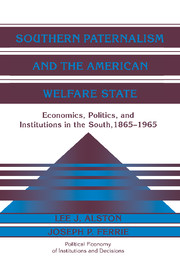 Southern Paternalism and the American Welfare State
Southern Paternalism and the American Welfare State Book contents
- Frontmatter
- Contents
- Preface
- Introduction
- 1 The Economics of Paternalism
- 2 The Politics of Maintaining Paternalism
- 3 Southern Opposition to the Social Security Act
- 4 Southern Opposition to the Farm Security Administration
- 5 The Bracero Program and Wartime Farm Labor Legislation
- 6 Mechanization and the Disappearance of Paternalism
- Conclusion
- References
- Index
- Titles in the series
2 - The Politics of Maintaining Paternalism
Published online by Cambridge University Press: 05 May 2010
- Frontmatter
- Contents
- Preface
- Introduction
- 1 The Economics of Paternalism
- 2 The Politics of Maintaining Paternalism
- 3 Southern Opposition to the Social Security Act
- 4 Southern Opposition to the Farm Security Administration
- 5 The Bracero Program and Wartime Farm Labor Legislation
- 6 Mechanization and the Disappearance of Paternalism
- Conclusion
- References
- Index
- Titles in the series
Summary
The value of paternalism to the Southern rural elite depended on the availability of substitutes for paternalism. The appearance of substitutes provided by the government – programs providing old-age security, unemployment insurance, medical care, or greater security in commercial and legal dealings – would have raised the cost of monitoring labor and reduced the elite's ability to keep labor dependable and cheap. Substitutes for paternalism provided by the private sector – the provision of farming supplies and household goods on favorable terms from local merchants, the opportunity for Southern workers to migrate to jobs outside the South, or the appearance of new employment opportunities within the South created by inflows of capital from outside the South – would have raised reservation wages. The Southern planter elite worked to prevent any of these developments in order to limit the threat to their form of labor relations.
Southern landowners did not operate directly in politics but instead used Congressmen as their political agents. The Democratic party in the South dominated politics after Reconstruction and was controlled by landowners and merchants in the counties dominated by plantation agriculture – the black belt elites. In the early 1870s the commitment to Reconstruction by the North began to wane due to allegations of corruption and the economic recession of the 1870s. In the South the fall in agricultural prices hurt all farmers, and poor white farmers reacted more favorably to the racist rhetoric of the Redeemer (Democratic) governments than if times had been good.
- Type
- Chapter
- Information
- Southern Paternalism and the American Welfare StateEconomics, Politics, and Institutions in the South, 1865–1965, pp. 34 - 48Publisher: Cambridge University PressPrint publication year: 1999
